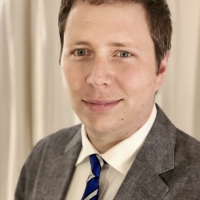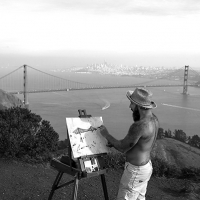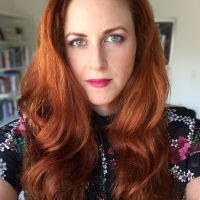GUH People: Valentina Rozas-Krause
Valentina Rozas-Krause is completing her PhD in Architecture at UC Berkeley in 2020. Starting this fall, she will join the University of Michigan as Collegiate Fellow in the History of Art Department. This postdoctoral fellowship is part of the College of Literature, Science and the Arts (LSA) Collegiate Fellows program, which prepares scholars for tenure-track appointments at the University of Michigan. During her postdoctoral appointment Valentina will work on her book project Memorials and the Cult of Apology, based on her dissertation, and start her next research project Postcolonial Windhoek, on the urban and architectural legacies of German colonialism in Namibia. She completed the Graduate Certificate in Global Urban Humanities and organized the GUH symposium Techniques of Memory.
 You have been very involved with the Global Urban Humanities Initiative from its early days, including organizing last year's Techniques of Memory symposium, completing the Graduate Certificate, and now teaching as a GSI for this year's graduate studio on Berlin (ARCH 209/HISTART 290, co-taught by Lauren Kroiz in History of Art and Andrew Shanken in Architecture). What was it about GUH that appealed to you? How has it shaped your research and/or pedagogy on urban memory?
You have been very involved with the Global Urban Humanities Initiative from its early days, including organizing last year's Techniques of Memory symposium, completing the Graduate Certificate, and now teaching as a GSI for this year's graduate studio on Berlin (ARCH 209/HISTART 290, co-taught by Lauren Kroiz in History of Art and Andrew Shanken in Architecture). What was it about GUH that appealed to you? How has it shaped your research and/or pedagogy on urban memory?
I got involved with the GUH initiative during my first year at UC Berkeley, through the research studio ARCH 209/RHETOR 250 ART+VILLAGE+CITY in the Pearl River Delta co-taught by Margaret Crawford (Architecture) and Winnie Wong (Rhetoric) What drew me to this studio, and later to many more GUH courses, events, and publications was the opportunity to move outside my area of expertise and experience new topics, new cities, and new methods. I think and work comparatively. Thus, in my research I often draw on case studies to make distinctions and to understand similarities.
GUH has provided a rich opportunity to learn about new cases, which in turn has illuminated my work on the role that memory and related processes of apology, justice, and reparation play in shaping the built environment. Be it living in an urban village in Guangzhou, learning about the history of Mexico City, sharing my research with fellow urbanites across campus, GUH has deeply shaped my research and my methods. I particularly value the interdisciplinarity of the GUH courses, which as a student and a GSI, have allowed me to work with historians, geographers, artists, anthropologists, city planners, musicologists and social workers.
Are there any lessons you learned from your experiences in GUH and at Berkeley that you'll take with you into the next phase of your career?
The GUH experience that has most influenced my teaching is the research studio, which combines the close reading and research from a seminar with the experimental making agenda of a studio. I am currently working on a course for the University of Michigan that incorporates this hybrid model. Further, as an architect trained in relatively autonomous Schools of Architecture, before coming to UC Berkeley I understood my role in the discipline from a standpoint focused on design. GUH has significantly contributed to expand that vision, now I see my research on architecture and cities much more grounded in the humanities, which in turn has opened new topics, cases and venues to explore.
 Do you have a fun or memorable GUH moment that you would like to share?
Do you have a fun or memorable GUH moment that you would like to share?
What can be more fun than singing ABBA with Chinese artists in a karaoke bar? Well, that happened after our ART+VILLAGE+CITY in the Pearl River Delta studio visit to Dafen in Shenzhen, a urban village populated by painters and artists who work on sidewalks reproducing famous paintings by Van Gogh and Leonardo da Vinci, as well as creating original art.
My most memorable GUH moment happened recently, in Berlin: The Guilt Environment studio. Prompted by a couple of assignments that asked our students to think about German reparation policies and imagine alternatives for the reunification of Berlin, the classroom was completely transformed. Students played scenes in a German reparations claim office, and imagined how an East Berlin neighborhood meeting would have responded to the installation of capitalism and gentrification. We concluded the latter session eating bananas –a symbol for the ‘free’ Berlin– and discovering messages from east Berliners hidden inside the once-exotic fruit.
Are you listening/reading/watching something right now that is getting you through the shelter-in-place period?
Like many of us I’ve been obsessed with watching the news during quarantine, so much so that displays of sibling rivalry between the Cuomo brothers, Dr. Sanjay Gupta’s sensual hand-washing, and Rachel Maddow’s sharp stares have come to populate my dreams. To extricate these figures from my sleep I’ve started to devotedly read the memories of Vicente Pérez Rosales –a Chilean writer, politician, traveler, explorer, merchant, miner and so much more– every night.
It’s difficult to convey what these 600 pages of narrative do–sometimes it reads like a private journal, or an ethnography, others like a travel log, and sometimes like a short story, or a speech, or a bureaucratic report. Pérez Rosales’s writing is filled with rhythm, it’s diverse, surprising and sometimes also boring, which I appreciate late at night. As a child he lived through the Chilean Independence from Spain, he joined the Chilean independence army, he was sent into exile by his parents aboard a British ship, he went to boarding school in Paris, he started many failed business, travelled across the Andes mountains by horse and moved to California during the Gold Rush as a miner. He met queens, kings, diplomats, miners, farmers, smugglers, poets, artists and writers.
Pérez Rosales’s memoir is the perfect quarantine reading not only because it transports you through so many different places and historical events, but also because it serves as a reminder of how full life can be if we are willing to explore it.
Do you have a favorite "global" dish or cuisine? It can be a dish from a place you have traveled to, a recipe that you have been cooking at home or has been passed down to you.
I’m an enthusiastic eater, and an astonishingly bad cook, which has not made quarantine much easier. Despite all warnings I’ve recently started to explore cooking again. During the past two months I made an almost pleasant loaf of bread and a brownie that went straight to the trash can. My only success was making a German-style, Kräuterquark-covered baked potato. This might sound awfully simple, but to me it was a great achievement because it tasted just like the steakhouse baked potatoes I remember from my childhood in Berlin.
GUH People: Ettore Santi
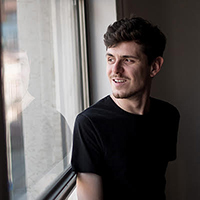 Ettore Santi is a doctoral candidate in the Architecture department at UC Berkeley. He recently recieved a 2020 Mellon Dissertation Research Fellowship for his dissertation on "Designing a Land Revolution: The Corporate Reinvention of China's Rural Environment." Ettore received the Graduate Certificate in Global Urban Humanities in 2018 and took ARCH 209/RHETOR 250 Art+Village+City in the Pearl River Delta GUH studio course co-taught by Margaret Crawford (Architecture) and Winnie Wong (Rhetoric) in 2015, which was formative to his research development. How were you first introduced to the Global Urban Humanities Initiative and what made you want to join? Before becoming a graduate student at CED,…
Ettore Santi is a doctoral candidate in the Architecture department at UC Berkeley. He recently recieved a 2020 Mellon Dissertation Research Fellowship for his dissertation on "Designing a Land Revolution: The Corporate Reinvention of China's Rural Environment." Ettore received the Graduate Certificate in Global Urban Humanities in 2018 and took ARCH 209/RHETOR 250 Art+Village+City in the Pearl River Delta GUH studio course co-taught by Margaret Crawford (Architecture) and Winnie Wong (Rhetoric) in 2015, which was formative to his research development. How were you first introduced to the Global Urban Humanities Initiative and what made you want to join? Before becoming a graduate student at CED,…
GUH People: Madison Roberts
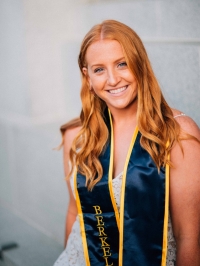 Madison Roberts graduated from UC Berkeley with a Bachelor's in Urban Studies in 2019. She was a student in the 2019 GUH Undergraduate Studio on New Orleans co-taught by Anna Brand in Landscape Architecture and Bryan Wagner in English (LDARCH 154+199/AMERSTD 102), focusing on the relationship between historical memory and urban design. Currently, she is an AmeriCorps volunteer working for the city of Salinas as Housing Resources Coordinator, and we asked her to share her Global Urban Humanities experiences in this short intervew. You were one of the students in the 2019 GUH undergraduate studio focusing on New Orleans. Tell us a little bit about your…
Madison Roberts graduated from UC Berkeley with a Bachelor's in Urban Studies in 2019. She was a student in the 2019 GUH Undergraduate Studio on New Orleans co-taught by Anna Brand in Landscape Architecture and Bryan Wagner in English (LDARCH 154+199/AMERSTD 102), focusing on the relationship between historical memory and urban design. Currently, she is an AmeriCorps volunteer working for the city of Salinas as Housing Resources Coordinator, and we asked her to share her Global Urban Humanities experiences in this short intervew. You were one of the students in the 2019 GUH undergraduate studio focusing on New Orleans. Tell us a little bit about your…


